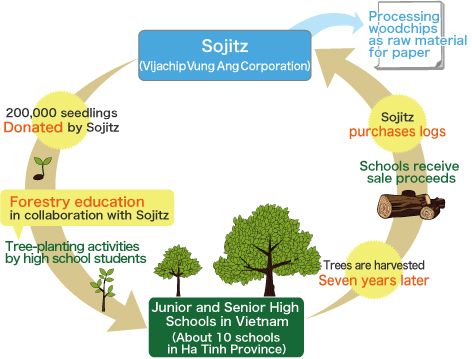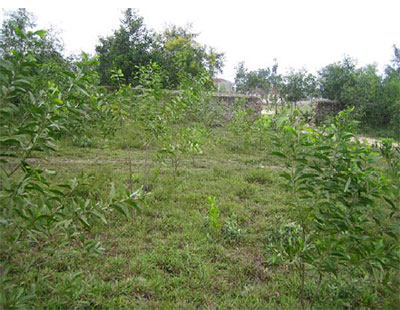Sojitz to Donate 200,000 Seedlings to Vietnamese Schools Annually
-Original Afforestation Program Develops Plantation and Contributes to the Development of Local Communities-
Dec. 1, 2009
Sojitz Corporation will establish a program to contribute to the development of local communities in Vietnam through afforestation activities. Under the program, Sojitz will donate Acacia seedlings to junior and senior high schools with the aim of conveying the importance of plantation to students through tree-planting activities. Sojitz will also support economic contribution to such schools by purchasing the trees after they have grown.
Sojitz engages in the woodchip processing and tree-planting businesses through three joint ventures established with local companies in central and northern Vietnam. It is through one of the companies, Vijachip Vung Ang Corporation, that Sojitz will start donating Acacia seedlings to about 10 junior and senior high schools in the Ky Anh district of Ha Tinh Province, which are located in central Vietnam. The program will be expanded to the two other companies next year to firmly establish the Sojitz group’s tree-planting activities in Vietnam.
Sojitz plans to donate 200,000 seedlings in the first year and to continue the donation in subsequent years. The recipient schools will plant the seedlings on nearby idle land, teaching the students about the importance of protecting the natural environment. Sojitz plans to dispatch tree-planting trainers, conduct environmental education, and explain the economic importance of forestry business in the region. In addition, Japan Vietnam Fertilizer Company, a Vietnamese fertilizer manufacturing and sales company that is a member of the Sojitz group, will provide the fertilizer needed by the seedlings.
Sojitz will also purchase the grown trees from the schools, process them into woodchips, and export them to Japan for paper manufacturing. Acacia trees are harvestable seven years after planting. Vijachip Vung Ang Corporation, a woodchip processing company, will purchase the harvested logs, providing the schools with a source of revenue. If this forestry system can be expanded beyond schools, it will generate sustainable economic activity in the local community.
Acacia trees have the effects of fixing the nutrient nitrogen in the soil and of restoring soil stability. In addition to improving soil condition, various environmental benefits of growing Acacia have been confirmed including preventing the occurrence of hot winds, restoring wildlife that has disappeared from the region, and contributing to underground water supplies.
Japan is the third largest paper producing country in the world after the U.S. and China, and it depends on large volumes of imports of the woodchips that are used to produce paper. Sojitz is working to expand a new system in the plantation business that can create new economic value with strong ties to local communities in order to secure stable supply of woodchips, an important natural resource in consideration of the forest environment.

[Sojitz’s original tree-planting program will nurture forests
and contribute to the development of local communities]

[Young trees planted near a school]
